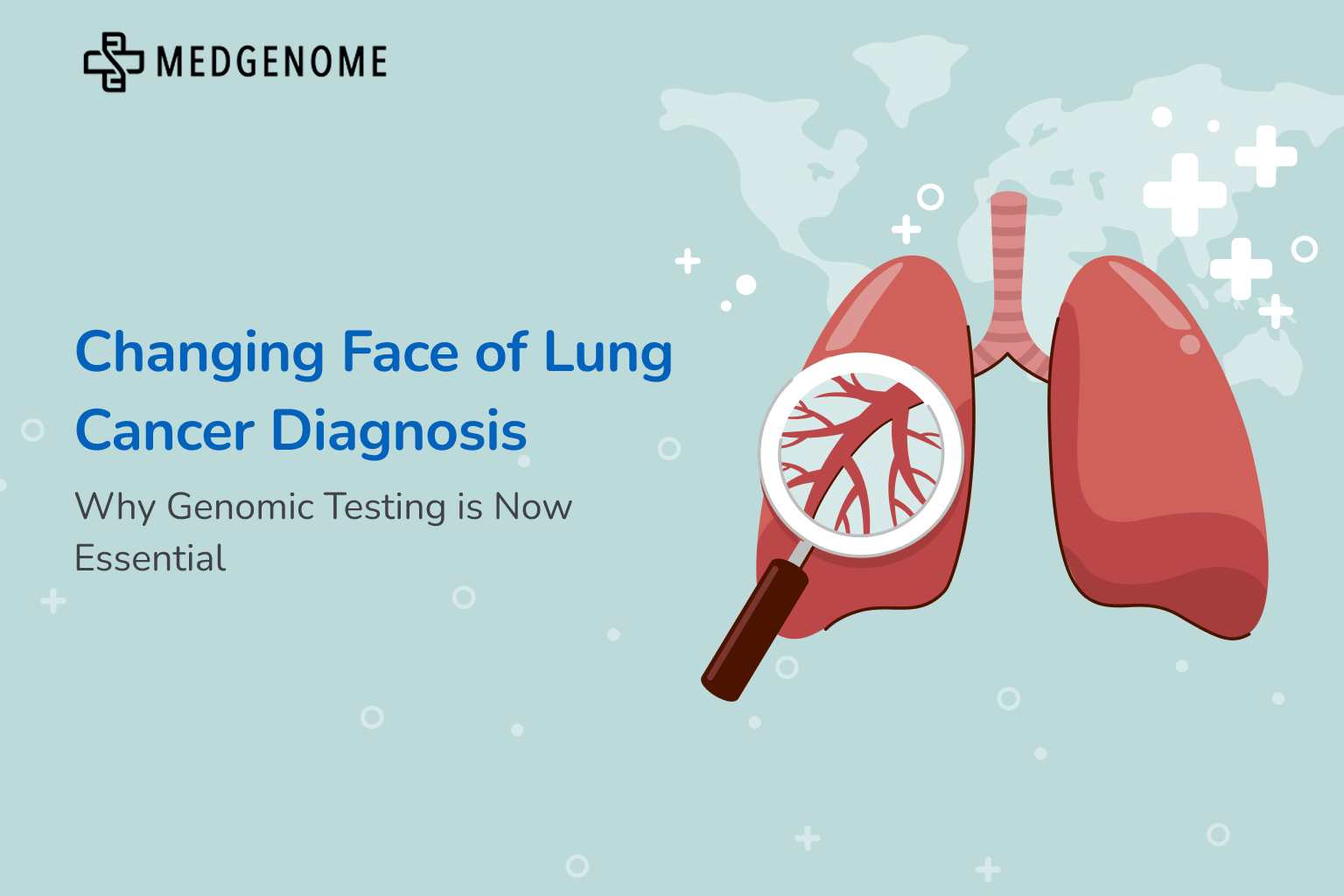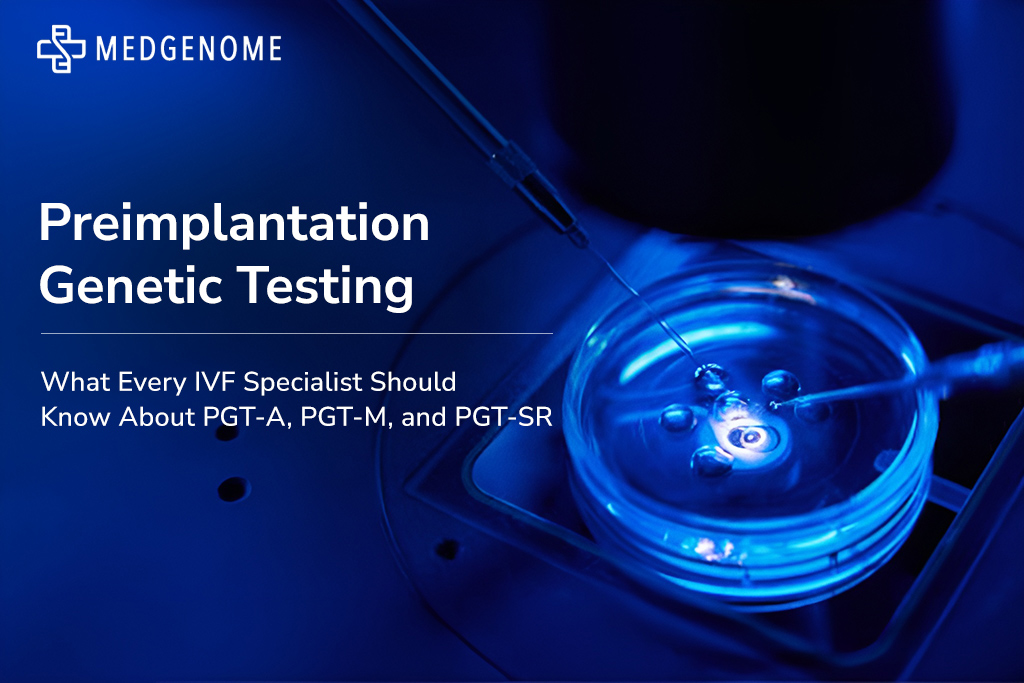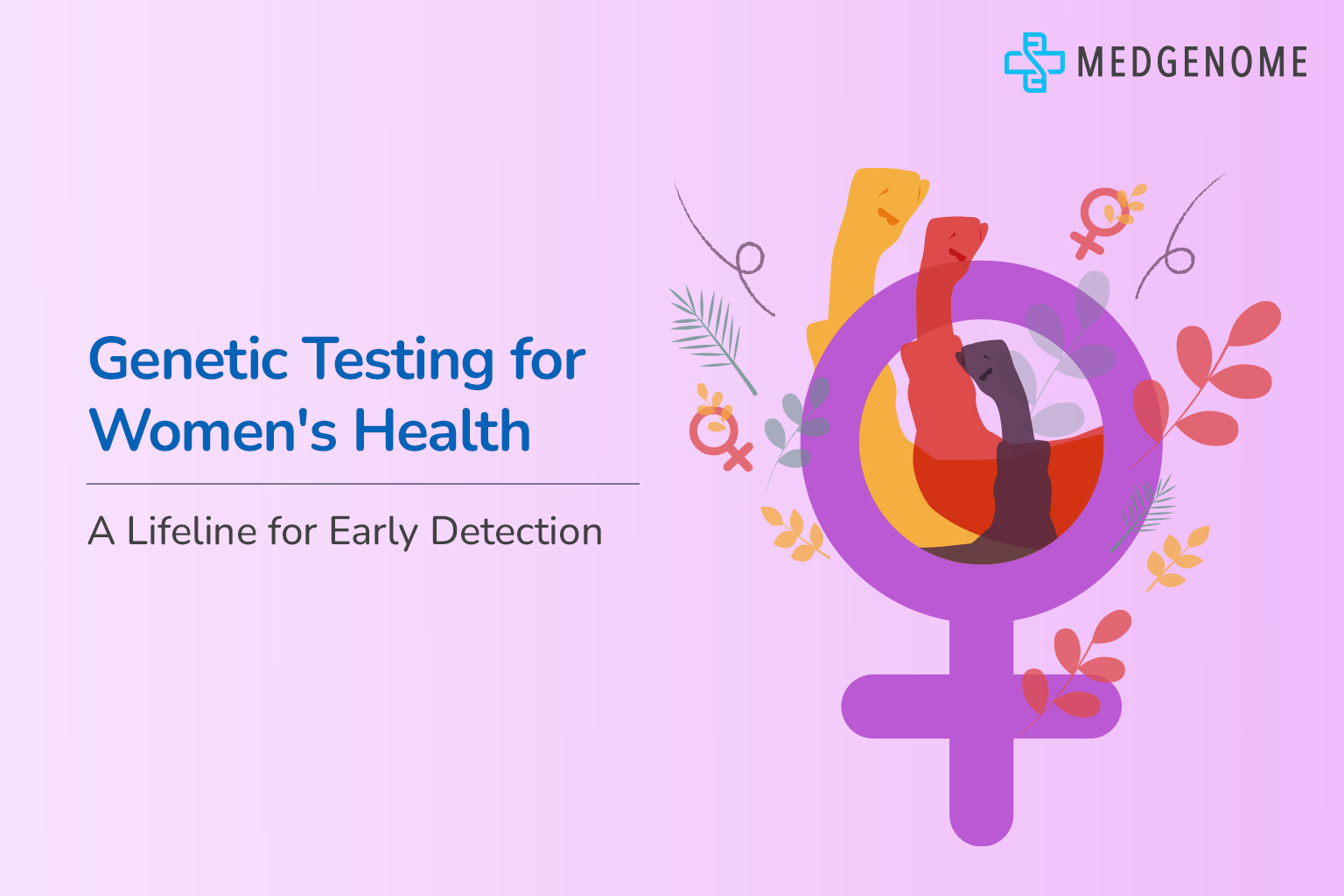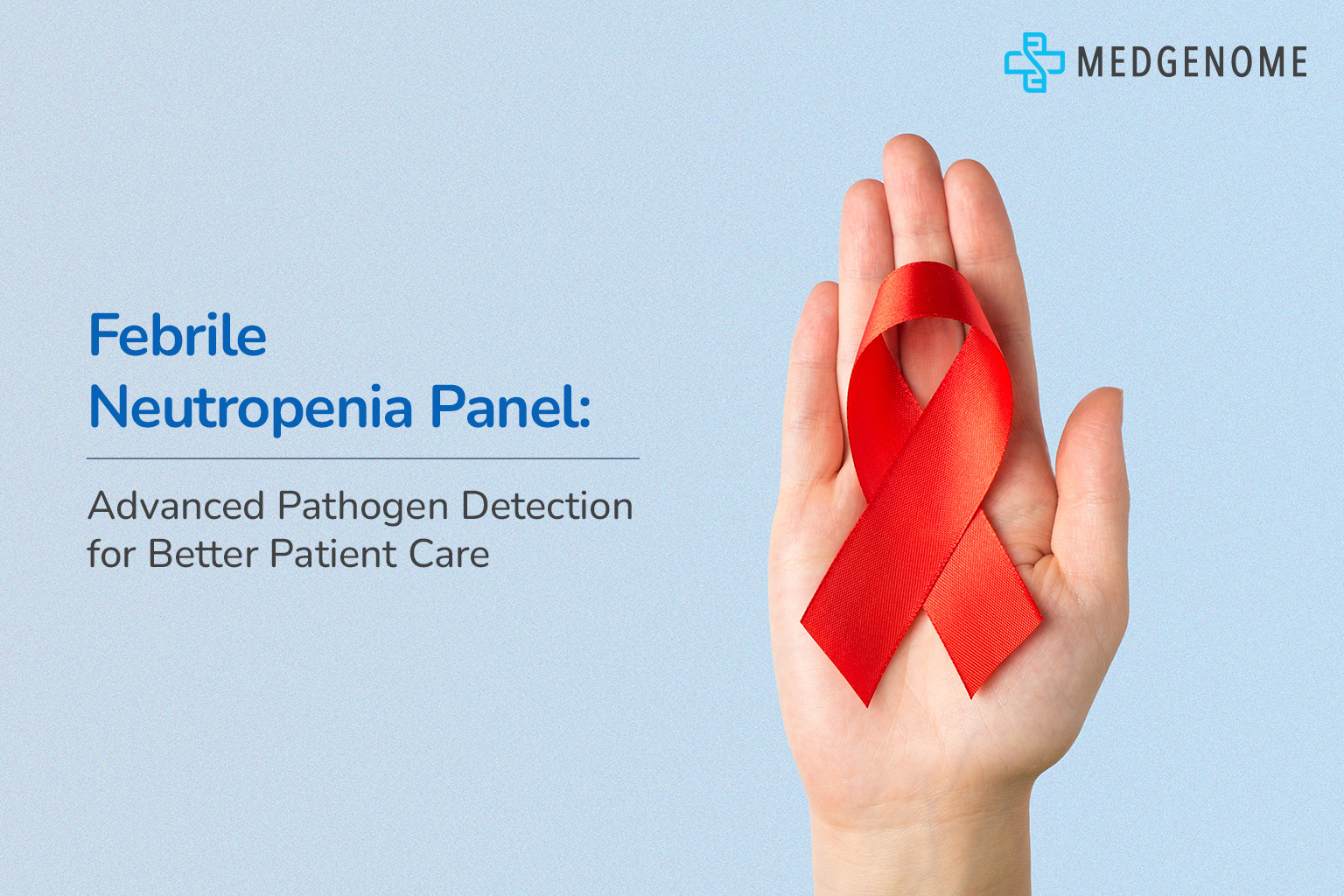Lung cancer remains one of the leading causes of cancer-related mortality worldwide, with non-small-cell lung cancer (NSCLC) accounting for approximately 85% of all cases. 1 Traditional approaches to diagnosis and treatment relied heavily on histopathological examination and imaging techniques. While this is important, it often provides limited insights into the molecular mechanisms driving the disease.
For this reason, traditional diagnostic methods are now being complemented, and in some cases, redefined, by genomic testing. This new-age approach analyses the genetic factors of tumours, detecting mutations that drive cancer growth. The result is a shift from one-size-fits-all treatments to highly targeted, personalised treatment.
Understanding Lung Cancer and the Role of Genomics
The emergence of genomic testing has changed lung cancer diagnosis in a revolutionary way. By analysing the genetic makeup of a patient’s tumour, clinicians can identify specific mutations and molecular alterations that influence disease progression and response to treatment.
Genomic testing allows for the detection of mutations in key oncogenes and tumour suppressor genes, such as EGFR, ALK, KRAS, ROS1, and TP53. 2 This molecular profiling is essential for guiding personalised treatment strategies, including targeted therapies and immunotherapies, which have demonstrated improved survival rates and quality of life for patients.
Genomic testing does not just detect cancer. It reveals the specific genetic changes driving it and helps doctors design precision treatments tailored to each person’s unique cancer biology. 3
The Evolution of Lung Cancer Diagnosis
Historically, lung cancer diagnosis depended on a combination of chest X-rays, CT scans, bronchoscopy, and tissue biopsies. While these methods provided essential diagnostic confirmation, they lacked the ability to detect molecular changes critical to understanding cancer behaviour. The limitations of purely morphological diagnosis became increasingly evident as survival rates remained low despite advances in surgical techniques and chemotherapy.
The integration of genomic and proteomic profiling into diagnostic protocols represents a pivotal advancement. Studies have demonstrated that tumour tissues harboured distinct genetic signatures associated with disease progression and treatment response. Genomic testing can now identify mutations from a variety of sample sources, including blood (liquid biopsies) and sputum, offering less invasive diagnostic options 4
This evolution has shifted the focus from merely detecting the presence of cancer to understanding its molecular identity, enabling clinicians to target specific pathways and mechanisms that drive tumour growth.
Benefits of Genomic Testing in Lung Cancer
The advantages of genomic testing in lung cancer are multifaceted:
- Personalised Treatment Plans: Molecular profiling enables oncologists to match patients with therapies designed to target specific mutations. For instance, patients with EGFR mutations benefit from tyrosine kinase inhibitors (TKIs), while ALK-positive cases respond to ALK inhibitors. 5
- Improved Prognostic Accuracy: Genomic insights allow for more accurate prognosis by identifying high-risk molecular features that may influence the disease course.
- Minimising Unnecessary Toxicity: Targeted therapies often present fewer systemic side effects compared to conventional chemotherapy, improving patient quality of life.
- Enhanced Surveillance for Relapse: Genomic markers can be monitored over time through liquid biopsies, enabling early detection of recurrence or resistance mutations.
In clinical practice, genomic testing provides not only a diagnostic advantage but also a transformative approach to treatment selection, offering patients the best chance of a favourable outcome.
Challenges and the Future of Genomic Testing in Lung Cancer
While genomic testing offers opportunities for precision medicine, several challenges remain:
- Access and Cost: In many regions, genomic testing remains expensive and inaccessible to a large portion of the population.
- Turnaround Time: Delays in obtaining results can postpone treatment initiation.
- Clinical Interpretation of Variants: Not all detected genetic changes have known clinical significance, making clinical interpretation challenging.
- Integration into Routine Care: Some healthcare systems lack the infrastructure to incorporate genomic testing seamlessly into diagnostic pathways.
MedGenome Labs is addressing these challenges head-on. As a leader in advanced genomic diagnostics, MedGenome offers comprehensive next-generation sequencing (NGS) panels tailored for lung cancer. Their testing covers a wide spectrum of actionable mutations, delivers results with industry-leading turnaround times, and includes robust bioinformatics support to assist oncologists in treatment planning.
By combining deep expertise in molecular oncology with scalable, cost-effective testing solutions, MedGenome is making precision oncology accessible to more patients. Looking ahead, research is focusing on expanding the range of actionable genetic targets, integrating multi-omics approaches (combining genomics, proteomics, and metabolomics), and improving bioinformatics pipelines for faster and more accurate interpretation.
As sequencing costs decline and technology becomes more widespread, genomic testing will likely become a standard component of lung cancer diagnosis and management.
The Process of Genomic Testing in Lung Cancer
The journey of genomic testing in lung cancer follows a structured sequence to ensure accuracy and clinical relevance:
| Step | Process | Details |
| Pre-test Requirements | Consultation | A clinician reviews the patient’s personal and clinical history, discusses the potential benefits and limitations of testing. |
| 2. Sample Collection | Tissue Biopsy or Liquid Biopsy | Tissue biopsy from a lung tumour using needle biopsy, bronchoscopy, or surgical resection. Liquid biopsy uses blood to detect circulating tumour DNA (ctDNA), which is useful if tissue collection is not possible. |
| 3. Genomic Analysis | 1. Next Generation Sequencing (NGS)2. Fluorescence In Situ Hybridisation3. Sanger Sequencing & Fragment Analysis4. Real-Time qPCR5. Droplet-Digital PCR6. Immunohistochemistry | NGS screens for mutations, fusions, and copy number variations in genes such as EGFR, ALK, ROS1, BRAF, KRAS, MET, and RET. May also include IHC for PD-L1 to determine immunotherapy suitability. |
| 4. Data Interpretation & Reporting | Analysis of actionable alterations | Mutations are matched to approved targeted therapies or clinical trials. Results are compiled in standardised reports for oncologists. |
| 5. Clinical Integration | Personalised treatment selection | Treating doctors explain the results, their implications, and possible treatment or monitoring strategies. |
| 7. Ongoing Monitoring | Repeat testing during treatment | Liquid biopsies or re-biopsies monitor resistance mutations or disease progression to adjust therapy accordingly. |
This systematic approach ensures patients receive comprehensive, actionable results supported by expert guidance.
Conclusion
The integration of genomic testing into lung cancer diagnosis represents a fundamental shift from one-size-fits-all treatment to precision oncology. By revealing the genetic underpinnings of a patient’s cancer, clinicians can select therapies that are more effective, less toxic, and tailored to the individual’s disease biology.
In India, MedGenome Lab’s Molecular Testing for Lung Cancer is helping make this shift a reality. Its advanced panels detect a wide spectrum of clinically actionable mutations, including EGFR, ALK, ROS1, KRAS, and MET, enabling oncologists to match patients with targeted therapies or clinical trials from the outset. With rapid turnaround times, high sensitivity, and comprehensive reporting, MedGenome is bridging the gap between cutting-edge science and everyday clinical practice.
While challenges such as cost, accessibility, and variant interpretation remain, ongoing advances in technology and research are steadily addressing these barriers. In the coming years, genomic testing is poised to become not just an optional tool but an essential standard of care for lung cancer patients.
FAQ
What role do genetic mutations play in lung cancer diagnosis and treatment?
Genetic mutations are critical in lung cancer diagnosis and treatment because they reveal the molecular drivers of the disease. Identifying mutations through genetic testing for lung cancer allows oncologists to select targeted therapies, improving treatment outcomes and reducing unnecessary side effects.
How does genomic testing differ from traditional diagnostic approaches in lung cancer?
Traditional lung cancer diagnostics rely mainly on imaging and histopathology, which confirm cancer type but not its molecular profile. Genetic testing for lung cancer analyses tumour DNA to detect actionable mutations, enabling precision medicine and personalised treatment strategies that standard tests cannot provide.
Is genomic testing widely accessible to all lung cancer patients?
While genetic testing for lung cancer is becoming more common, access remains uneven due to cost, limited infrastructure, and lack of awareness in some regions. However, advances by providers and falling costs are steadily improving availability worldwide.
References:
- Verma, S. K., Pandey, M., Khare, R., & Singh, D. (2024). A review on non-small cell lung cancer. Vacunas, 25(2), 239–253.
https://www.sciencedirect.com/science/article/abs/pii/S157698872300105X - Matsumura, Y., Owada-Ozaki, Y., & Suzuki, H. (2018). Significance of testing for TP53 gene mutations in lung adenocarcinoma using targeted gene sequencing. Journal of Thoracic Disease, 10(S33), S4147–S4150. https://doi.org/10.21037/jtd.2018.10.66
- An overview of lung cancer genomics and proteomics. Am J Respir Cell Mol Biol.
https://www.atsjournals.org/doi/full/10.1165/rcmb.F290 - The role of genomics and proteomics in lung cancer early detection and treatment. https://pmc.ncbi.nlm.nih.gov/articles/PMC9600051/.
- Bouchard, N., & Daaboul, N. (2025). Lung cancer: targeted therapy in 2025. Current Oncology, 32(3), 146.
https://pmc.ncbi.nlm.nih.gov/articles/PMC11941068/











 Enquire
Now
Enquire
Now